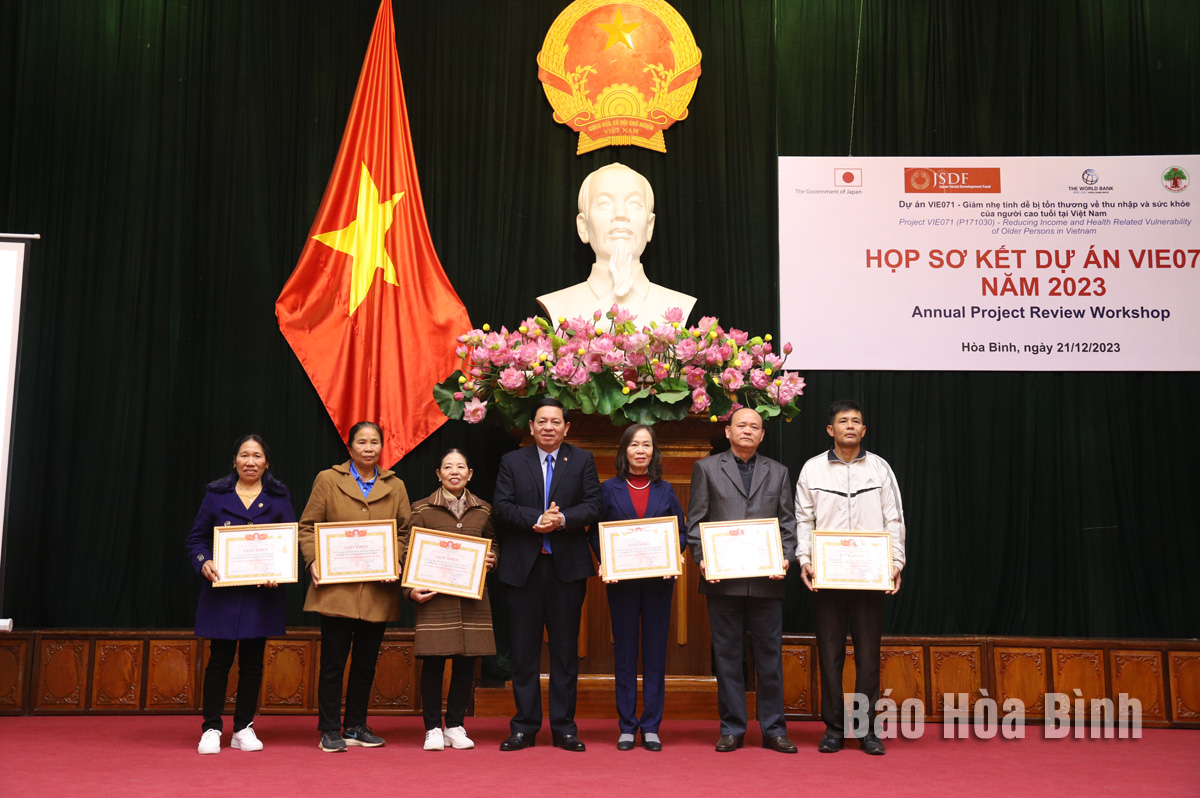
Hoa Binh province’s Association of the Elderly and HelpAge International in Vietnam (HAI) on December 21 organised a conference to summarise the implementation of the project "Reducing Income and Health-Related Vulnerabilities of Older Persons in Vietnam” (VIE071) in the province.

Leaders
of the provincial elderly association award certificates of merit to six
intergenerational self-help clubs.
Project VIE071 is funded by the Japanese Government through the World Bank, and
implemented by the provincial Association of the Elderly and HAI with technical
support from the Vietnam Association of the Elderly.
To date, it has supported the establishment of 30
intergenerational self-help clubs, attracting nearly 1,500 people.
The clubs have been operating effectively this year, helping
provide care to and promote the role of the elderly in the social community.
Under the project, 858 members have been supported to access
loans worth over 4.2 billion VND (172,800 USD).
All the clubs got monthly training and technical support while
366 officers of the elderly association at all levels, the clubs’ leaders,
volunteers and the grassroots medical team were trained and and got their
capacity improved. At the same time, the project has promoted the participation
of relevant departments and branches in developing and expanding the model
across the province.
At the conference, delegates discussed solutions to implement the targets set
for next year. The province aims to have 75 intergenerational self-help clubs
by 2025.
On this occasion, the Vietnam Association of the Elderly awarded a
commemorative medal to an individual of HAI and the provincial association
awarded certificates of merit to six clubs for their excellent performance in
2023.
The Standing Board of the Hoa Binh provincial Party Committee has agreed in principle on a proposal by the Standing Board of the Party Committee of Hoa Binh city to gather feedback on the city’s 1:2000 zoning plan, which forms part of its broader urban development strategy.
Hoa Binh province has made notable progress in public administration reform and digital government development, with the satisfaction index among citizens and businesses reaching over 84%, according to recent government evaluations.
Thanks to great efforts by local authorities in recent times, the governance and public administration performance of Mai Chau district has been significantly improved.
In the afternoon of June 6, the Party Committee, the People's Council, the People's Committee and the Fatherland Front of Lac Son district solemnly held a meeting to celebrate the 139th anniversary of the district's founding (1886–2025) and the 79th anniversary of the establishment of the district's Party Committee (1946–2025). There was the attendance of Mr. Bui Van Thang, the Vice Chairman of the Provincial People's Council; Mr. Quach Tat Liem, the Vice Chairman of the Provincial People's Committee; Ms. Dang Bich Ngoc, the Deputy Head of the National Assembly Delegation of the province; as well as the former leaders of the province and district through various periods, who are the natives of the district.
Implementing the Politburo’s Resolution No. 57-NQ/TW on breakthroughs in science – technology, innovation, and digital transformation is a golden opportunity for the northern mountainous province of Hoa Binh to renew growth model, improve competitive edge and shorten digital gap.
Resolution 57-NQ/TW, issued by the Politburo on December 22, 2024, identifies sci-tech, innovation, and digital transformation as strategic breakthroughs to build a developed and prosperous nation. In Hoa Binh province, this spirit is not just a slogan, it’s being put into action through concrete initiatives that form a "new development triangle”: digital citizenship, digital economy, and digital administration.



